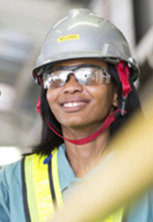Looking beyond the mine gate to deal with COVID-19
22 June, 2020

Why public-private partnerships are essential in the mining industry’s response to the pandemic
The COVID-19 pandemic has brought about several challenges for South Africa, its people, and industries such as mining, which is one of the country’s largest employers. On any given day, our country is troubled with persistent social and economic ills, and this pandemic has only exacerbated these.
Some weeks ago, I asked our employees how many of them would be able to withstand the numerous pressures brought by the pandemic over a protracted period. Judging from their responses, I knew then that the mining industry and the country were facing one of its biggest challenges in living memory.
During the early days of the nationwide lockdown, the mining industry recognised how important it is to safeguard our people’s lives, while also protecting their livelihoods. There is no separation between lives and livelihoods because the social, economic and mental health and safety of our people is our overarching value. It is this imperative that has driven the mining industry’s difficult choices and response to the pandemic. As an industry, we have had to sit down and thoughtfully reflect on how we might work in partnership with our employees, contractors and host communities to provide them with the support that they require during this time.
In our case, as Anglo American, this is all part of what it means to re-imagine mining to improve people’s lives. It is to think of the entire chain of vulnerabilities that our people and host communities are exposed to because of this pandemic, and work with government and other partners to deal with the devastating impacts
There is no question that we have a role to play in preventing and responding to, and recovering from, the Covid-19 pandemic, as we are part of the essential infrastructure that helps to provide services such as water, energy and healthcare services to our employees, their families and our host communities. Much of this work happens across the country, in towns and regions that are crucial to the sustainability of South Africa’s mining industry.
Collaborating beyond the mine gate in Mpumalanga
The Mpumalanga region is an important part of South Africa’s mining industry, and the country’s energy generation capacity, in particular. This province is home to South Africa’s major coal-fired power stations, producing close to 80% of the country’s coal and helping generate much-needed foreign earnings for South Africa through coal sold in the export market.
As the reality of the pandemic began to sink in over two months ago, it was clear to us as a company that we needed to act with great care to ensure that we do as much as we can to help those left vulnerable by the effects of the pandemic. Our first point of call was to look at the availability of the infrastructure that we, as the mining industry, develop in partnership with the government to serve our people and host communities. An honest assessment of our readiness to deal with the pandemic, from an infrastructure point of view, was necessary in helping us figure out how we would need to work together to capacitate numerous clinics, hospitals, community centres and facilities that are now playing an important role in the region’s fight against the virus.
Our Anglo-American Coal Highveld Hospital in Mpumalanga, which generally services the health needs of our employees, was immediately earmarked as a quarantine isolation facility for COVID-19 positive patients – equipped with 85 additional bed units.
We have also recently opened a Covid-19 PCR testing laboratory in our hospital with a minimum capacity of 300 tests per day. We know that the more we screen and test, the more positive cases we will find. And given we may be testing more intensely than is the case nationally, it may look like mining is some form of hotspot for the virus, but that is a false assertion. The fact we are identifying more cases is a good thing, and helps us keep our people and communities safe. We have acted with speed and conviction and have been deliberate in our response.
Closer to home at our operations themselves, we were clear that things had to change.
If you were to take a walk around any of our operations today, you will hopefully be reassured to see the extent of measures that we have taken within and beyond the mine gate over the past two months, to mitigate the spread of the virus, bearing in mind that this is something that is new and is still changing for all of us.
In our underground mines, for example, we have created small teams called cells, that work in clearly defined groups. In this way, we know that if we were to have an infection in one small group, it would be quickly managed without it spreading to the whole mine. Beyond the sanitising and social distancing measures in place, we have provided thermometers to our employees so that the screening for symptoms begins in the home. In the event of an employee having symptoms associated with the virus, a clinical associate from our zones of influence is allocated to them for an assessment that can be escalated to a testing lab.
We have also seen firsthand the importance of doing all we can to help those that are economically vulnerable at this time.
Our partnership with the Gift of the Givers is helping us distribute over 1 500 food parcels per month to vulnerable community members such as the elderly and child-headed households. The long queues of people waiting for food that we have seen throughout the lockdown are a harsh reminder of the economic impact of the virus, and that many more people need help.
Our Emalahleni Water Reclamation Plant, which was designed to provide potable water to the people of Emalahleni, has also been an important part of our response to the pandemic in the region. With the increased focus and importance of hygiene in households and public facilities, the Plant provides water to over 80 000 households who live in the water-stressed area.
Looking after our young people is also top of mind for us. The lockdown has forced university students to leave their university residences and study at home, often in environments that are not conducive to undisrupted learning and studying. By working with Careerwise, our longstanding education programme partner, we have ensured that the beneficiaries of the Anglo American Coal Community Scholarship are well capacitated by providing them with access to tools and materials to enable them to carry on with their learning during this period.
All of these initiatives, and many others that have been undertaken by other companies in the Anglo American group and the mining industry more broadly, demonstrate that we truly are stronger, together.
Despite our challenges as a country and as an industry, we have come together to realise the collective power we have to ease the burden that this pandemic has wrought on our country. There is more to be done, particularly as we start thinking through what the socio-economic recovery national plan ought to be when we finally emerge from this crisis.
But one thing is clear: we all must pull together in one direction to deal with this pandemic. This will set the stage for the next phase of our country’s future – where I believe mining will continue to play an important role – and that is to build an economy that can create jobs, sustenance and dignity for everyone, now more than ever. May we not take this duty lightly.
July Ndlovu is the CEO of Anglo American’s Coal business in SA




